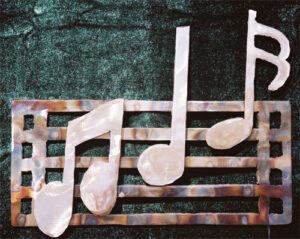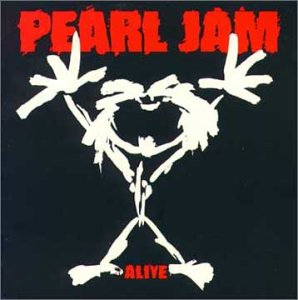 I grew up on what is now called “classic rock.” Kansas, AC/DC, Judas Priest, Def Leppard, I saw them all in concert. After thirty years, though, how many times can you “Shoot to Thrill“? So I moved on to various incarnations of what is now generically labeled “alternative” rock. My last three downloads from iTunes are Flobots “White Flag Warrior,” AFI “Beautiful Thieves,” and Cold War Kids “Audience.” “Classical music” was something that was on the FM dial just a slight twist of the knob away from 97.9 “The Loop” in Chicago – yes, kids, this is before the invention of digital tuning. My parents didn’t listen to classical music, my grandparents didn’t listen to it. I made it to seminary – and through seminary – without being exposed in any meaningful way to Bach or Mozart apart from the movie Amadeus. Given the choice I would prefer that the instruments accompanying our hearing of God and singing back to him include more than just an organ – drum, bass guitar, brass, woodwind, whatever.
I grew up on what is now called “classic rock.” Kansas, AC/DC, Judas Priest, Def Leppard, I saw them all in concert. After thirty years, though, how many times can you “Shoot to Thrill“? So I moved on to various incarnations of what is now generically labeled “alternative” rock. My last three downloads from iTunes are Flobots “White Flag Warrior,” AFI “Beautiful Thieves,” and Cold War Kids “Audience.” “Classical music” was something that was on the FM dial just a slight twist of the knob away from 97.9 “The Loop” in Chicago – yes, kids, this is before the invention of digital tuning. My parents didn’t listen to classical music, my grandparents didn’t listen to it. I made it to seminary – and through seminary – without being exposed in any meaningful way to Bach or Mozart apart from the movie Amadeus. Given the choice I would prefer that the instruments accompanying our hearing of God and singing back to him include more than just an organ – drum, bass guitar, brass, woodwind, whatever.
 My daughters live in another world. As young parents we felt that blasting Pearl Jam into our little babies’ precious ears would not be a good idea. So we left the car radio tuned to a classical station, in Cleveland and then in St. Louis. For the parents it was just background music, the volume kept low enough so it didn’t interfere with driving or conversation. But the kids safely strapped into the backseat must have been paying attention to the radio, not to us. When fifth grade came along, our daughters’ school (Christ Community Lutheran) offered beginning band in conjunction with Lutheran High South. Our oldest picked up a flute and progressed from beginning band to “junior winds.” Then in high school (at Clayton High) we were referred to the former principal flautist with the St. Louis Symphony Orchestra (SLSO) for lessons, and she hasn’t looked back. She’s been through local and state competitions, football and basketball games, school musicals, and now as a sophomore is first chair in her school symphonic band. Her high school band received top marks in a recent competition for a piece in which she played a piccolo solo. The youngest took a slightly different route. She started with piano at a young age, picked up trumpet in fifth grade beginner band, and in sixth grade switched over to French horn (which has a much more pleasant sound than a trumpet – trust me). Again, we lucked into a referral to a horn player with the SLSO, who actually wasn’t taking students but agreed to take on our daughter. (Yes, I am boasting in my daughters—forgive me). We’ll see where all this goes with both.
My daughters live in another world. As young parents we felt that blasting Pearl Jam into our little babies’ precious ears would not be a good idea. So we left the car radio tuned to a classical station, in Cleveland and then in St. Louis. For the parents it was just background music, the volume kept low enough so it didn’t interfere with driving or conversation. But the kids safely strapped into the backseat must have been paying attention to the radio, not to us. When fifth grade came along, our daughters’ school (Christ Community Lutheran) offered beginning band in conjunction with Lutheran High South. Our oldest picked up a flute and progressed from beginning band to “junior winds.” Then in high school (at Clayton High) we were referred to the former principal flautist with the St. Louis Symphony Orchestra (SLSO) for lessons, and she hasn’t looked back. She’s been through local and state competitions, football and basketball games, school musicals, and now as a sophomore is first chair in her school symphonic band. Her high school band received top marks in a recent competition for a piece in which she played a piccolo solo. The youngest took a slightly different route. She started with piano at a young age, picked up trumpet in fifth grade beginner band, and in sixth grade switched over to French horn (which has a much more pleasant sound than a trumpet – trust me). Again, we lucked into a referral to a horn player with the SLSO, who actually wasn’t taking students but agreed to take on our daughter. (Yes, I am boasting in my daughters—forgive me). We’ll see where all this goes with both.
Trying to be good parents, and having invested a fair amount into instruments and lessons, we decided that we should encourage our daughters’ interest by taking them to performances of the SLSO. Have you seen the price of symphony tickets? But the symphony offers what they call a “family series“: four short performances spread over the season, lasting about an hour, of important and familiar pieces at a reasonable price. They even threw in a pair of “real” performance tickets at no cost for the adults to enjoy. So, we dutifully took the kids, fully expecting to get in my normal Sunday afternoon naps. The first performance was Britten’s Young Person’s Guide to the Orchestra. It wasn’t really that exciting for me; the girls had a great time picking out their instruments from the orchestra, watching the warm-up, etc. I nearly slept. The second performance in the series took place near Christmas, featuring familiar selections from the Nutcracker Suite along with a few members of a ballet company. The music was familiar and the visual element kept me awake, but I wouldn’t have gone out of my way to see it again. A few weeks ago, however, in the midst of the SLSO’s “Beethoven Festival” the family concert featured the music of Beethoven, including, of course the overture to Symphony no. 5 and piece that I recognized by ear but had never identified, his Eroica.
I felt life. It was as if it were the first warm, Spring-like morning. The kind of morning where you walk out the door and you smell and taste and feel life in the air. When you remember again that you are alive. Sitting at that performance was like the first time I tasted a 1996 Lynch-Bages. I stopped, paralyzed, dazzled, charmed by what my senses were encountering. I had wine before, but not like that. And I heard music before, but not like that. Music that I felt, and tasted, and reminded me that I was alive.
Two weeks later we got to use our “free tickets” at a Valentine’s Day weekend performance of “romantic music.” When we picked out that show from the list of options back in September, it seemed like a good way to “celebrate” Valentine’s Day without being ridiculous. But I knew none of the music going in, and had no expectations then of actually enjoying it. The first piece was Tchaikovsky’s Romeo and Juliet. From the opening note I sat motionless, transfixed, for twenty minutes. One of the high school band teachers told the students that all music is either a “love song” or a “pirate song.” My daughter told me this, and now after her performances we discuss which pieces fall into which category. I’ll fully admit to preferring pirate songs, which is why I preferred Tchaikovsky (with its depiction of the fight between Tybalt and Mercutio) to Berlioz’ Love Scene from Romeo et Juliette, which focused on the balcony scene. But I had received a gift, through my daughter, a basic lens with which to see what I was hearing. It also explains why I liked the background music from the Pirates of the Caribbean movies.
Now what? I’ll admit to feeling like some kind of addict. Checking the remaining SLSO concert schedule, looking at pricing plans for a subscription to next year’s season, bidding on symphony tickets at the youth group silent auction fundraiser, googling Washington University’s music department web site for concerts – most of them free, and only two blocks from Concordia Seminary. The next performance on the calendar of the SLSO featured Holst’s Planets. I had no idea what that was (though my daughters did, of course) so I checked out a CD from the library. Next I was trying to figure out whether I could scrape together enough money out of the family budget to buy four tickets or if I’d have to sell myself on the street. That Pirates of the Caribbean music? It is a crib of the first and fourth movements of Planets. Pirate music. I have to be there.
[youtube AGGlL1wexQk nolink]
This term I am teaching again one of my favorite courses: E-109 Biblical Theology. It is a fun class, designed specifically to help fourth-year students put all the pieces back together. After dissecting Hebrew verbs and Greco-Roman contexts they step back and remind themselves again of the sweep of the biblical narrative: God restoring his broken creation through the work of his Son, Jesus Christ, in his crucifixion, resurrection, and appearing. I have the students read and reflect on some challenging material in order to help them do this, and one book I added to the reading list a couple years ago is N. T. Wright’s Surprised by Hope. It is not perfect, of course (is any theological work perfect?). One of his emphases is that on the last day creation will not be annihilated, but restored (a perfectly creedal, Lutheran view, incidentally). He goes on, perhaps perilously, to imagine what from this present creation will endure into the New Creation. Among other things, he opines that he expects to hear Bach in the New Creation. Whatever one thinks of such speculation, I puzzled over the choice of Bach. Yes, we have Bach’s personal Bible, with his own annotations, in our seminary library. I fully expect to meet J. S. Bach in the New Creation, but I never wondered if I’d hear his music there. My own personal music tastes at the time of first reading that book led me to conclude differently. According to my reasoning, most AC/DC stuff wouldn’t make it (“Highway to Hell” pretty much cuts them out), and Arctic Monkeys is too new to have a proven track record. “Kashmir”? “More Than a Feeling”? I chalked up Wright’s preferences to just that, his preference. He has his tastes, and I have mine. You listen to your music with your perfectly restored ears in the life to come, and I’ll listen to mine with my new ears. Those Brits are all a bit elitist and Old World anyway. What is their contribution to music since The Clash – Coldplay? No wonder he’s stuck on Bach.
Wright’s version of the New Creation has left in me one of those impressions that are not fleeting but embedding. It left a question that I could not answer. Why Bach? Wright also said something about art and architecture, but those didn’t stick with me because I neither know nor care much for the visual arts and architecture. Maybe I should, but music has always been a big interest for me. Perhaps it stuck because he was shaking the last vestiges of Americanized gnosticism out of my system by forcing me consider what “real things” would be there in the New Creation. To think in concrete, physical terms about what it would look like when God restores creation itself – when he releases creation from its slavery to decay (Rom 8:21) and transforms it into his perfect creation. The New Creation will not made up of Platonized essences of things in this world — just as the resurrected Jesus was not a mere essence or thought or spirit, but a glorified, transformed piece of the old creation.

This restoration of all creation has already started in the death and resurrection of Jesus Christ. Jesus did surprisingly physical things after his resurrection. Pointing to scars in his body, breaking bread, and in an unmistakeably physical action, eating dinner. In doing so he signalled that his glorified body was capable of eating, digesting, perhaps even enjoying roasted fish (Luke 24:42-43). It is evident that he could also see, hear, and reason. He could recognize his disciples, his mind had not been wiped clean of Aramaic. And while there is no specific mention in the text, presumably he could taste what he ate and could feel the fish’s bony flesh crunching between his resurrected teeth. That covers all the senses. He has the same body after his resurrection as the one that had hung on a cross and been placed in a tomb, dead. Same, but glorified and about to return to the Father. He was not some mere idea or thought or essence or soul. What he could eat before he could eat also as the resurrected Son of God. What he could hear before he could still hear. The act of restoring the sin-corrupted creation started already in the resurrection of the body of Jesus, the first-fruits of the New Creation (1 Cor 15:20, 23). Might it be that when Jesus digested his breakfast that morning and it became part of his glorified body that a tiny, oily, flame-broiled piece of creation was already becoming transformed, ahead of time, into his New Creation – a very real downpayment on the restoration of all things on the last day?
Now I think I understand Wright’s expectation of hearing Bach in the New Creation. Bach will not be raised as a reformatted hard drive, as a shell of a body with a blank slate where his mind used to be. He will be resurrected as J. S. Bach, the composer, the musician. The music he made while living in this creation, broken and imperfect as it is, will not be scrubbed from his brain. But it will endure, restored, perfected. The music that helped us understand ourselves and our world, helped us praise our Creator will help us to celebrate new life and bring glory to our Lord in the new creation.
Are there not some things in this creation worth holding on to? Since we will not become cherubs floating on wisps of clouds, nor will our “souls” be reabsorbed into The One, are there not some things in this creation that we should encourage in our children, in ourselves, in our church? After all, he has given me eyes, ears and all my senses, a body – and still preserves them. And he is taking all those parts with him through the cross and out of my own burial into his resurrection, making our doomed-to-death bodies like his glorious body on that great and terrible day (Phil 3:21). If he is taking you and me with him – my hands, and reason and senses into his New Creation, why would he not also take what those hands have made, what that mind has thought, what those senses have felt – transormed, cleansed, purified – but nonetheless real?
We did make it to the performace of Planets. Only three tickets, my wife stayed home, but we made it. The first part of the performance was a Ligeti violin concerto. I didn’t get it, though my daughters did (naturally). During the intermission the younger daughter picked out her horn instructor as she was warming up on stage. When the cacophony of the orchestra tuning was completed and the rhythm of the strings and percussion began their slow boil in the first movement, “Mars,” the air filled with life. You could feel and taste the sound. For fifty minutes I was carried along, the journey interrupted only by the spontaneous (and apparently unusual) applause after most of the movements, and by the shaved head of the hulking, professional wrestler-type sitting two rows in front of us, who was shaking the entire section while he rocked along to “Uranus.” Real, flesh-in-the-blood life, through music.
[youtube 51oHwMiqslo nolink]
When we settled into our seats in Powell Hall, my oldest daughter noticed a small plaque fixed to hers. She was tickled to see that it was a quote attributed to Martin Luther: “Music is a fair and glorious gift of God.” Did he actually say it? Is it one of those apocryphal utterances, such as “If I knew the world were to end tomorrow I would plant a tree”? I don’t know. Luther could have said both, and both remind us that God, the Father, the creator of the heavens and the earth has blessed his creation with beauty, a beauty that reflects his creation and, even in a small way, his own glory. Last week I heard, from an upstairs bedroom, the sound of the horns in “Jupiter,” the fourth movement of Planets. At first I thought that my daughter had turned the CD up too loud. Then I realized, after a few halting notes, that she was teaching herself, by ear, to play the parts of that movement. I stood at the bottom of the stairs, receiving a gift from my daughter.
Unfortunately, this generation of parents in St. Louis will no longer be able tune their car radios to classical music. This seminary’s church body, in the name of “saving souls” for Jesus, is selling off the St. Louis station that my daughters listened to – still listen to as teenagers – to an organization whose mission statement reads: “Desiring obedience above all, we will use Christian Music as a means of encouraging believers, uniting the body of Christ and sharing the clear, life-changing message of Jesus with the world” (yes, “Christian Music” is capitalized). Some laudable goals – some. You can use your Lutheran lenses to figure out if this music genuinely brings “the” life-changing message of the Gospel. Some “contemporary Christian music” no doubt brings glory to God. Some of it may even endure into the New Creation. Perhaps. What little I’ve heard of it seems trite and sacharine to me. But we are losing a birthright, something passed down to us by our parents and grandparents, in what looks like a “reverse-mortgage” strategy — hold on to your standard of living today by mortgaging what you have inherited. And we are getting in return a mess of pottage. I received a gift from my daughters. Perhaps we should give it back.


Leave a Reply
You must be logged in to post a comment.